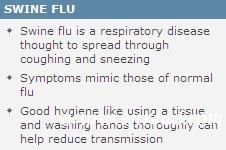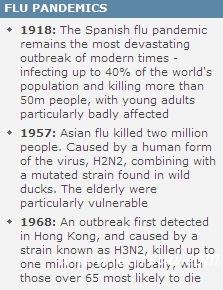| ||||||||||||||||||||||||||||||||||||||||||||||||||||||||||||||||||||||||||||||||||||||||||||||||
|
South Korean officials have found a suspected case of swine flu in a woman who recently returned from Mexico. 韩国官员发现一例刚从墨西哥回国的疑似猪流感的女性。 Asian countries have stepped up checks at airports Health authorities are carrying out clinical tests on the woman, officials and news reports said. Mexico, with 149 deaths suspected to be due to the virus, is the epicentre(震中). The World Health Organization (WHO) has raised its alert level. In Asia, several countries have been conducting tests on travellers to check for symptoms of swine flu. In Australia, 19 people are being tested, with several hundred more who might have had contact with the disease being sought(寻找). New Zealand has identified 10 probable cases, and is investigating another 56 among people who have recently returned from Mexico or neighbouring countries. China and Thailand are among the countries reported to have banned imports of meat products from some parts of the US and Mexico as they attempt to protect themselves from the virus. Human to human The South Korean case involves a 51-year-old Korean woman who has been quarantined(隔离,检验) at her home near the capital, Seoul, and given antiviral(抗病毒的) medicine, said Jun Byong-yul of the Korea Centers for Disease Control and Prevention. She had returned home from Mexico via Los Angeles on Sunday, he said. Two other people in South Korea who were suspected to have contracted the virus have tested negative. The WHO's decision to raise the alert level to four came after an emergency meeting of experts, brought forward by a day because of concerns over the outbreak. The level was raised from three to four - two steps short of declaring a full pandemic. Level four means the virus is showing a sustained ability to pass from human to human, and is able to cause community-level outbreaks. WHO Assistant Director General Dr Keiji Fukuda said a pandemic was not inevitable1, but containment2 was no longer plausible3(似真实的,似合理的) and countries should focus on protecting the population. In Mexico 149 people are believed to have died from the swine flu outbreak, though just 20 cases there are confirmed. Other, milder, cases are confirmed in the US, Canada, Spain and Britain. Earlier, Beijing banned pork imports from Mexico and the US states of Texas, Kansas and California with immediate5 effect, according to state news agency Xinhua. China's Ministry6 of Health has warned its citizens to be vigilant7(警醒的,警惕的), although it also noted8 that so far there is no evidence that the new flu virus can be spread through food. Thailand was also reported to have banned meat and pork imports from some parts of the US. In Hong Kong, where the Severe Acute Respiratory Syndrome9 (Sars) killed hundreds of people in 2003, a series of tough measures have been announced. All travellers are to be screened on arrival and anyone who is ill will be quarantined. Japan, Singapore, Malaysia and Indonesia have announced similar plans, with many airports using devices that were put in place to monitor Sars and bird flu over the last few years. Tokyo has announced that Mexican citizens will no longer be able to obtain visas on arrival in Japan. H1N1 is the same strain that causes seasonal10 flu outbreaks in humans but the newly detected version contains genetic11 material from versions of flu which usually affect pigs and birds. It is spread mainly through coughs and sneezes. Mr Fukuda of the WHO said the first batches12 of a swine flu vaccine could be ready in four to six months, but it would take several more months to produce it large quantities. 点击  收听单词发音 收听单词发音
|
||||||||||||||||||||||||||||||||||||||||||||||||||||||||||||||||||||||||||||||||||||||||||||||||
- 发表评论
-
- 最新评论 进入详细评论页>>






